#book publishing house
Explore tagged Tumblr posts
Text
What is an Epigraph in Literature? Definition and Examples

What is an Epigraph?
An epigraph in literature is a brief quotation, phrase, or snippet that appears at the beginning of a book, chapter, or section. It frequently alludes to the theme or establishes the tone for the work to come. Epigraphs are used by authors to add background, pique the reader’s interest, or reveal the story’s deeper significance. For example, in F. Scott Fitzgerald’s The Great Gatsby, the epigraph echoes the novel’s themes of ambition and the pursuit of unreachable aspirations.
Epigraphs are more than just decorative; they reveal the author’s intent. They can set the scene, pique interest, or create a thematic resonance. For readers, an epigraph can feel like a secret handshake an intimate connection to the story that follows.
How Epigraphs are Used in Literature
Setting the Tone of a Story
Epigraphs are an effective tool for establishing the tone of a story. They are frequently placed at the opening of a book or chapter and contain a quotation, poetry, or saying that alludes to the narrative’s topics or atmosphere. Epigraphs generate a sense of anticipation by revealing the emotional or intellectual depth of the story. A haunting epigraph from a famous poet, for example, can set the tone for a story of mystery or tragedy, preparing readers for what is to come.
Highlighting Themes and Ideas
Epigraphs are frequently employed in literature to emphasize the primary themes or ideas of a work. Authors can establish the tone and steer readers towards the story’s deeper message by beginning each book or chapter with a brief, significant quote. These lines might provide insight into the author’s inspiration, present crucial conflicts, or foreshadow the resolution. A well-chosen epigraph acts as a thematic compass, expanding the reader’s knowledge of the story....Continue reading
#book publication#book writer#book writing#publishing#book authors#writing#book#book publishing#self publishing#literature#literary#book publish#self publish#book publishing companies#self publishing companies#self publication houses#book publishing house#self publication platform#book publication platform#self published authors#epigraph
0 notes
Text
Penguin Random House, AI, and writers’ rights
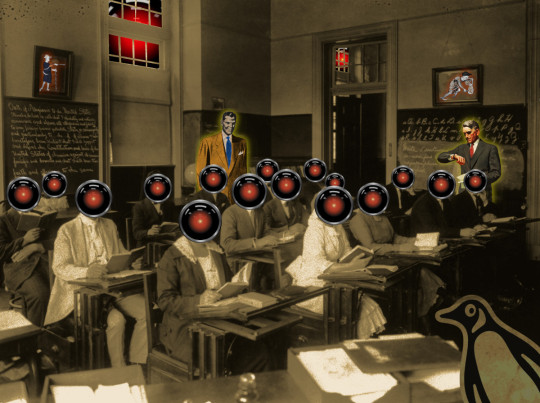
NEXT WEDNESDAY (October 23) at 7PM, I'll be in DECATUR, GEORGIA, presenting my novel THE BEZZLE at EAGLE EYE BOOKS.

My friend Teresa Nielsen Hayden is a wellspring of wise sayings, like "you're not responsible for what you do in other people's dreams," and my all time favorite, from the Napster era: "Just because you're on their side, it doesn't mean they're on your side."
The record labels hated Napster, and so did many musicians, and when those musicians sided with their labels in the legal and public relations campaigns against file-sharing, they lent both legal and public legitimacy to the labels' cause, which ultimately prevailed.
But the labels weren't on musicians' side. The demise of Napster and with it, the idea of a blanket-license system for internet music distribution (similar to the systems for radio, live performance, and canned music at venues and shops) firmly established that new services must obtain permission from the labels in order to operate.
That era is very good for the labels. The three-label cartel – Universal, Warner and Sony – was in a position to dictate terms like Spotify, who handed over billions of dollars worth of stock, and let the Big Three co-design the royalty scheme that Spotify would operate under.
If you know anything about Spotify payments, it's probably this: they are extremely unfavorable to artists. This is true – but that doesn't mean it's unfavorable to the Big Three labels. The Big Three get guaranteed monthly payments (much of which is booked as "unattributable royalties" that the labels can disperse or keep as they see fit), along with free inclusion on key playlists and other valuable services. What's more, the ultra-low payouts to artists increase the value of the labels' stock in Spotify, since the less Spotify has to pay for music, the better it looks to investors.
The Big Three – who own 70% of all music ever recorded, thanks to an orgy of mergers – make up the shortfall from these low per-stream rates with guaranteed payments and promo.
But the indy labels and musicians that account for the remaining 30% are out in the cold. They are locked into the same fractional-penny-per-stream royalty scheme as the Big Three, but they don't get gigantic monthly cash guarantees, and they have to pay the playlist placement the Big Three get for free.
Just because you're on their side, it doesn't mean they're on your side:
https://pluralistic.net/2022/09/12/streaming-doesnt-pay/#stunt-publishing
In a very important, material sense, creative workers – writers, filmmakers, photographers, illustrators, painters and musicians – are not on the same side as the labels, agencies, studios and publishers that bring our work to market. Those companies are not charities; they are driven to maximize profits and an important way to do that is to reduce costs, including and especially the cost of paying us for our work.
It's easy to miss this fact because the workers at these giant entertainment companies are our class allies. The same impulse to constrain payments to writers is in play when entertainment companies think about how much they pay editors, assistants, publicists, and the mail-room staff. These are the people that creative workers deal with on a day to day basis, and they are on our side, by and large, and it's easy to conflate these people with their employers.
This class war need not be the central fact of creative workers' relationship with our publishers, labels, studios, etc. When there are lots of these entertainment companies, they compete with one another for our work (and for the labor of the workers who bring that work to market), which increases our share of the profit our work produces.
But we live in an era of extreme market concentration in every sector, including entertainment, where we deal with five publishers, four studios, three labels, two ad-tech companies and a single company that controls all the ebooks and audiobooks. That concentration makes it much harder for artists to bargain effectively with entertainments companies, and that means that it's possible -likely, even – for entertainment companies to gain market advantages that aren't shared with creative workers. In other words, when your field is dominated by a cartel, you may be on on their side, but they're almost certainly not on your side.
This week, Penguin Random House, the largest publisher in the history of the human race, made headlines when it changed the copyright notice in its books to ban AI training:
https://www.thebookseller.com/news/penguin-random-house-underscores-copyright-protection-in-ai-rebuff
The copyright page now includes this phrase:
No part of this book may be used or reproduced in any manner for the purpose of training artificial intelligence technologies or systems.
Many writers are celebrating this move as a victory for creative workers' rights over AI companies, who have raised hundreds of billions of dollars in part by promising our bosses that they can fire us and replace us with algorithms.
But these writers are assuming that just because they're on Penguin Random House's side, PRH is on their side. They're assuming that if PRH fights against AI companies training bots on their work for free, that this means PRH won't allow bots to be trained on their work at all.
This is a pretty naive take. What's far more likely is that PRH will use whatever legal rights it has to insist that AI companies pay it for the right to train chatbots on the books we write. It is vanishingly unlikely that PRH will share that license money with the writers whose books are then shoveled into the bot's training-hopper. It's also extremely likely that PRH will try to use the output of chatbots to erode our wages, or fire us altogether and replace our work with AI slop.
This is speculation on my part, but it's informed speculation. Note that PRH did not announce that it would allow authors to assert the contractual right to block their work from being used to train a chatbot, or that it was offering authors a share of any training license fees, or a share of the income from anything produced by bots that are trained on our work.
Indeed, as publishing boiled itself down from the thirty-some mid-sized publishers that flourished when I was a baby writer into the Big Five that dominate the field today, their contracts have gotten notably, materially worse for writers:
https://pluralistic.net/2022/06/19/reasonable-agreement/
This is completely unsurprising. In any auction, the more serious bidders there are, the higher the final price will be. When there were thirty potential bidders for our work, we got a better deal on average than we do now, when there are at most five bidders.
Though this is self-evident, Penguin Random House insists that it's not true. Back when PRH was trying to buy Simon & Schuster (thereby reducing the Big Five publishers to the Big Four), they insisted that they would continue to bid against themselves, with editors at Simon & Schuster (a division of PRH) bidding against editors at Penguin (a division of PRH) and Random House (a division of PRH).
This is obvious nonsense, as Stephen King said when he testified against the merger (which was subsequently blocked by the court): "You might as well say you’re going to have a husband and wife bidding against each other for the same house. It would be sort of very gentlemanly and sort of, 'After you' and 'After you'":
https://apnews.com/article/stephen-king-government-and-politics-b3ab31d8d8369e7feed7ce454153a03c
Penguin Random House didn't become the largest publisher in history by publishing better books or doing better marketing. They attained their scale by buying out their rivals. The company is actually a kind of colony organism made up of dozens of once-independent publishers. Every one of those acquisitions reduced the bargaining power of writers, even writers who don't write for PRH, because the disappearance of a credible bidder for our work into the PRH corporate portfolio reduces the potential bidders for our work no matter who we're selling it to.
I predict that PRH will not allow its writers to add a clause to their contracts forbidding PRH from using their work to train an AI. That prediction is based on my direct experience with two of the other Big Five publishers, where I know for a fact that they point-blank refused to do this, and told the writer that any insistence on including this contract would lead to the offer being rescinded.
The Big Five have remarkably similar contracting terms. Or rather, unremarkably similar contracts, since concentrated industries tend to converge in their operational behavior. The Big Five are similar enough that it's generally understood that a writer who sues one of the Big Five publishers will likely find themselves blackballed at the rest.
My own agent gave me this advice when one of the Big Five stole more than $10,000 from me – canceled a project that I was part of because another person involved with it pulled out, and then took five figures out of the killfee specified in my contract, just because they could. My agent told me that even though I would certainly win that lawsuit, it would come at the cost of my career, since it would put me in bad odor with all of the Big Five.
The writers who are cheering on Penguin Random House's new copyright notice are operating under the mistaken belief that this will make it less likely that our bosses will buy an AI in hopes of replacing us with it:
https://pluralistic.net/2023/02/09/ai-monkeys-paw/#bullied-schoolkids
That's not true. Giving Penguin Random House the right to demand license fees for AI training will do nothing to reduce the likelihood that Penguin Random House will choose to buy an AI in hopes of eroding our wages or firing us.
But something else will! The US Copyright Office has issued a series of rulings, upheld by the courts, asserting that nothing made by an AI can be copyrighted. By statute and international treaty, copyright is a right reserved for works of human creativity (that's why the "monkey selfie" can't be copyrighted):
https://pluralistic.net/2023/08/20/everything-made-by-an-ai-is-in-the-public-domain/
All other things being equal, entertainment companies would prefer to pay creative workers as little as possible (or nothing at all) for our work. But as strong as their preference for reducing payments to artists is, they are far more committed to being able to control who can copy, sell and distribute the works they release.
In other words, when confronted with a choice of "We don't have to pay artists anymore" and "Anyone can sell or give away our products and we won't get a dime from it," entertainment companies will pay artists all day long.
Remember that dope everyone laughed at because he scammed his way into winning an art contest with some AI slop then got angry because people were copying "his" picture? That guy's insistence that his slop should be entitled to copyright is far more dangerous than the original scam of pretending that he painted the slop in the first place:
https://arstechnica.com/tech-policy/2024/10/artist-appeals-copyright-denial-for-prize-winning-ai-generated-work/
If PRH was intervening in these Copyright Office AI copyrightability cases to say AI works can't be copyrighted, that would be an instance where we were on their side and they were on our side. The day they submit an amicus brief or rulemaking comment supporting no-copyright-for-AI, I'll sing their praises to the heavens.
But this change to PRH's copyright notice won't improve writers' bank-balances. Giving writers the ability to control AI training isn't going to stop PRH and other giant entertainment companies from training AIs with our work. They'll just say, "If you don't sign away the right to train an AI with your work, we won't publish you."
The biggest predictor of how much money an artist sees from the exploitation of their work isn't how many exclusive rights we have, it's how much bargaining power we have. When you bargain against five publishers, four studios or three labels, any new rights you get from Congress or the courts is simply transferred to them the next time you negotiate a contract.
As Rebecca Giblin and I write in our 2022 book Chokepoint Capitalism:
Giving a creative worker more copyright is like giving your bullied schoolkid more lunch money. No matter how much you give them, the bullies will take it all. Give your kid enough lunch money and the bullies will be able to bribe the principle to look the other way. Keep giving that kid lunch money and the bullies will be able to launch a global appeal demanding more lunch money for hungry kids!
https://chokepointcapitalism.com/
As creative workers' fortunes have declined through the neoliberal era of mergers and consolidation, we've allowed ourselves to be distracted with campaigns to get us more copyright, rather than more bargaining power.
There are copyright policies that get us more bargaining power. Banning AI works from getting copyright gives us more bargaining power. After all, just because AI can't do our job, it doesn't follow that AI salesmen can't convince our bosses to fire us and replace us with incompetent AI:
https://pluralistic.net/2024/01/11/robots-stole-my-jerb/#computer-says-no
Then there's "copyright termination." Under the 1976 Copyright Act, creative workers can take back the copyright to their works after 35 years, even if they sign a contract giving up the copyright for its full term:
https://pluralistic.net/2021/09/26/take-it-back/
Creative workers from George Clinton to Stephen King to Stan Lee have converted this right to money – unlike, say, longer terms of copyright, which are simply transferred to entertainment companies through non-negotiable contractual clauses. Rather than joining our publishers in fighting for longer terms of copyright, we could be demanding shorter terms for copyright termination, say, the right to take back a popular book or song or movie or illustration after 14 years (as was the case in the original US copyright system), and resell it for more money as a risk-free, proven success.
Until then, remember, just because you're on their side, it doesn't mean they're on your side. They don't want to prevent AI slop from reducing your wages, they just want to make sure it's their AI slop puts you on the breadline.

Tor Books as just published two new, free LITTLE BROTHER stories: VIGILANT, about creepy surveillance in distance education; and SPILL, about oil pipelines and indigenous landback.
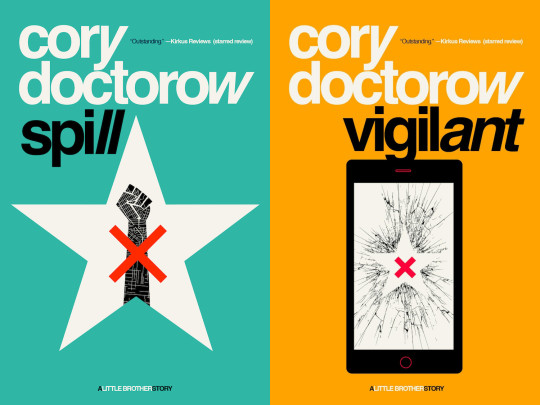

If you'd like an essay-formatted version of this post to read or share, here's a link to it on pluralistic.net, my surveillance-free, ad-free, tracker-free blog:
https://pluralistic.net/2024/10/19/gander-sauce/#just-because-youre-on-their-side-it-doesnt-mean-theyre-on-your-side

Image: Cryteria (modified) https://commons.wikimedia.org/wiki/File:HAL9000.svg
CC BY 3.0 https://creativecommons.org/licenses/by/3.0/deed.en
#pluralistic#publishing#penguin random house#prh#monopolies#chokepoint capitalism#fair use#AI#training#labor#artificial intelligence#scraping#book scanning#internet archive#reasonable agreements
731 notes
·
View notes
Text

Vincent P. Miceli - Women Priests & Other Fantasies - The Christopher Publishing House - 1985 (cover design by Robert E. Ward)
#witches#women priests#occult#vintage#other fantasies#the christopher publishing house#christopher books#vincent p. miceli#reverend#sociology#robert e. ward#new york#new orleans#1985
164 notes
·
View notes
Text






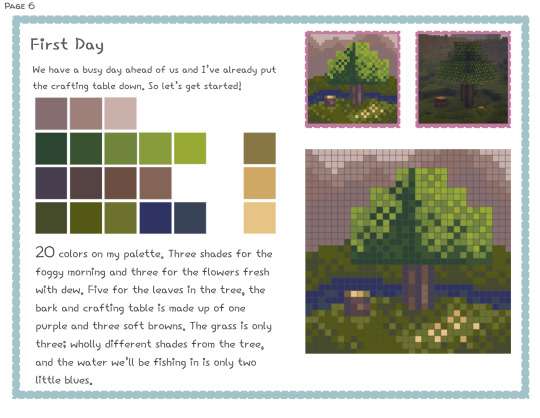
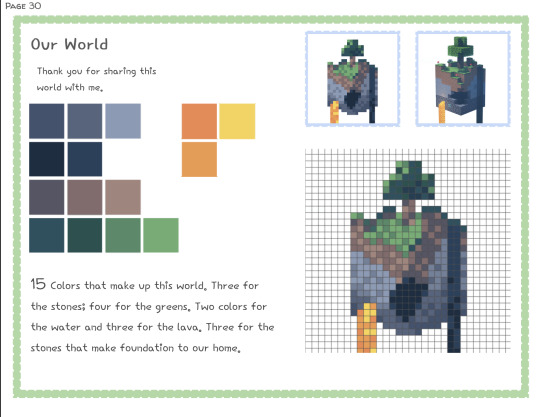

HELLO i have finally finished putting together a little book of cross stitch patterns made w minecraft. for free on Internet Archive !! :)
#my post#minecraft#the book has symbol patterns tho its not shown here#theres a total of twelve patterns in this little booklet its all free and u can do anything in the world that u want w them idc#HAVE FUN. LUV xo#cross stitch#cross stitching#cross stitch pattern#the misery publishing house logo/name is bc that is what i use to self publish my gothic literary btw#so on this archive acc there r my creative works and then one other pattern book abt sewing if any1 is interested idc ok bye ily#fiber art#fiber crafts#needlework
200 notes
·
View notes
Text
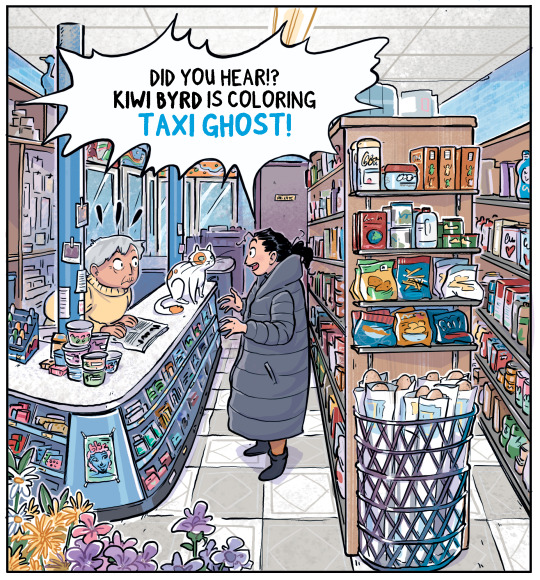
WE DID IT BOYS, I'm officially the colorist for the upcoming Taxi Ghost graphic novel by Sophie Escabasse!
#thas why ive been kinda MIA more than usual#this is literally a dream for me!!!#ive always wanted to get into comics and kids books#especially from a big publishing house like ranom house!#ive never tried so hard on anything in my life
603 notes
·
View notes
Text
5 Things about working in a (small) publishing house that surprised me
My experiences definitely aren’t true of the entire industry. I work in a very small, very local publishing house as a marketing assistant, and I’m certain that you’d have a much different experience at Penguin Random House, or even another small house on the other side of the country. That being said, here’s five things that really surprised me about what I’ve seen from the industry so far…
1. Very few of the people who work in publishing are writers
Okay this was one of the biggest surprises but also kind of makes sense? Publishing is a lot about the business side of things—numbers and marketing strategies and event planning, etc. People who are talented in design and accounting and other essential pieces to book publishing aren’t necessarily good at or practiced writers, and not all people who love reading also love writing!
I guess this surprised me so much because I’ve never been a reader without being a writer, but we often actually rely on the author’s writing on their own works (summaries, bios, etc.) to populate the backs of books and other marketing. Including me, there are three writers in my entire office.
2. Big booksellers (think Indigo) release yearly cover palettes for book covers
When we’re deciding the colours for a book cover, one thing that goes into that consideration is actually the different palettes Indigo releases! They have different palettes for different sections they update every year. I imagine it’s to fit a certain look for their shelves for new releases, but it’s not something I had ever really thought about, or thought that they would care about!
3. On that topic—publishing houses don’t sell to readers
My first day in marketing, my manager told me, “you’d think we’re selling to readers” I did think that. She said, “we’re actually selling to bookstores and libraries, they sell to readers.” How the money works is booksellers buy our books to put on their shelf. Everything they don’t sell, they’re allowed to trade back for credit, so we want them to buy big upfront, and then sell big to readers. Every book they send back is inventory we can’t get rid of and a “free” book for them down the line, so we don’t want books to come back!
If you want to support authors and your favourite publishing houses, buy from local bookstores who can’t afford to keep underselling books on their shelves for as long as say Indigo. If you really want to support authors, check out their books from libraries (yes really). Libraries are great because they buy books from publishing houses and can use the same one book to get into the hands of several readers, (in Canada) authors get a small amount every time a book is checked out (up to a certain amount so that the library’s entire budget doesn’t go to one book/author). Often, an author’s largest cheque is from libraries.
Unfortunately in the States authors don’t get the same boon, but still supporting your local libraries is just as good as supporting your local indie bookstores!
4. Soo many people look at covers, and soo much goes into creating them
I’m not really a designer, so I’m certain this wouldn’t surprise those of you who actually do graphic design, but they seriously look at every single detail and how it will benefit or hurt the sales. The placement of blurbs, choice of fonts, colours, subtitles, even the placement of raindrops for a rainy background, everything is discussed and tested and tried several different ways. So yes, DO judge a book by its cover, we work so hard on making covers perfect for the audience we’re trying to reach.
5. Publishing houses don’t necessarily have in-house editors, publicity, or other roles
I had always assumed that every publishing house had its own editors and publicists and what not. That’s probably true for the bigger ones, but if you’re being published by a smaller one (which you may be for your debut) you may be working with freelance editors and publicists who work somewhat with your publishing house and also with others as well. We have one in-house publicist, and no editors!
I wouldn’t turn down a publishing house just because they use freelancers (our freelancers are amazing!) but it’s important that they’re upfront about it. Huge red flag if they say they have in-house editors and they don’t actually—I would pass on a publishing house that lies to you.
Any other questions you have about the industry I’ll try to answer!
#writing#creative writing#writing community#writers#screenwriting#writing inspiration#books#filmmaking#film#writing advice#publishing industry#publishing#traditional publishing#trad publishing#publishing house
166 notes
·
View notes
Text
bucket list item: buying every single one of the clothbound penguin classics ever made
#aesthetic#dark academia#coffee#art#books#academia#college#light academia#studyblr#literature#Poetry#Poems#Novels#Stories#Writing#Writersblr#penguin random house#Publishing#penguin clothbound classics#Classics#penguin classics#Reading#books and reading#dark academia aesthetic#dark academia quotes#light academia aesthetic#Bucket list#Collections#Hardbound
196 notes
·
View notes
Note
Just fyi, unfortunately Peach Flowers House seems to be closing https://www.peachflowerhouse.com/closing
Damn. Thank you for letting me know.
They'd gotten so quiet this year that I'll own I had concerns but it's still a bummer to see those concerns are justified.
I just visited their webpage. Print books are 30% off and they're taking orders through November 30th (discontinuing outside the US shipping on the 15th). Ebooks will be on sale through the 15th.
I'm gonna grab a copy of University of the Underworld (ebook only), as it's their only danmei title I don't already own.
They have published in print editions:
Little Mushroom
Golden Stage
The Imperial Uncle
Peach Blossom Debt
In the Dark
I have read their translations of all of these and they're all solidly translated, decently edited, and excellent books. I honestly can't pick a favorite, they're all great in different ways. Little Mushroom is incredible, and I think everyone who likes spec fic should read it. The Imperial Uncle was delightful. If you like Modu and/or Poyun you'll almost certainly also enjoy In the Dark. Golden Stage I like so much I bought it even though I'd already read the fantranslation. It looks like at least some print titles are sold out; it's worth grabbing the ebooks if the print aren't available anymore.
It's depressing to know that if all the people I know who've said they want to or plan to read these books had actually gotten them, maybe they wouldn't be closing (but maybe they would, sales might not be the problem, idk). Regardless, you've got 2 weeks to a month left to buy them depending where you are in the world. Don't miss out, they're all great in their own ways.
If anyone outside the US wants me to play danmei mule and ship stuff forward lemme know, I can try to help.
#unforth rambles#peach flower house#danmei#little mushroom#golden stage#da feng gua guo#in case anyone has wondered why im so diligent about buying anything i can get my hands on from small presses#its because i was here when manga was first getting popular#a lot of those early publishers folded and when they did their titles became unobtainable#i didnt get things i wanted then#i will not make that mistake again#if i can possible afford a book i will get it rather than risk exactly this
51 notes
·
View notes
Text
Amazon Ads for Authors: A Step-by-Step Guide to Boosting Book Sales

If you’re an author wanting to increase your book sales, Amazon Ads could be the secret weapon. Why? Because Amazon is where millions of readers purchase every day. This article will teach you all you need to know about efficiently using Amazon Ads to increase your book’s visibility and earnings.
Why Amazon Ads Matter for Authors
Amazon is more than simply a bookshop; it is a thriving marketplace full of opportunity. Ads can help you stand out in the crowded world of books by bringing your title the attention it deserves.
Benefits of Amazon Advertising for Book Sales
Increases your book’s discoverability.
Allows precise targeting of your ideal readers.
Provides measurable results to fine-tune your strategy.
Types of Amazon Ads for Authors
Sponsored Products Ads
Sponsored Products Ads are among the most common sorts of Amazon Ads for authors. These advertisements promote individual books and display immediately in search results or product pages, making them easily apparent to potential readers. Authors can efficiently reach their target audience by focussing on specific keywords, categories, or books. The fee is calculated on a pay-per-click basis, which means you only pay when someone clicks on your ad. This makes Sponsored Products Ads a cost-effective strategy to enhance book sales....Continue reading
#book publication#book writing#publishing#book#writing#book authors#literature#book writer#self publishing#book publishing#boook publish#self publish#self publishing companies#book publishing companies#self publication houses#book publishing house#self publishing platform#book publishing platform#self published authors#amazon authors#amazon
0 notes
Text
The unfortunate truth is that no matter how much you tout literature as representative of all human nature, all novels are written by a very specific kind of person: the novelist
#zena hitz lost in thought i love you. if you can't defend your claims about human goodness by any means other than a reference to a novel#i simply can't take them seriously!!#examples from novels are on thin ice but i'll allow it. but making a claim about All Humanity and then only backing it up#with a character from a 20th-century white western highbrow novel?#get out of here#this goes for rowan williams more than for anyone else i know. the anglicans are dreadfully prone#even certain kinds of book references would add more diversity#when was the last time you saw little house on the prairie brought up in a theological text? or elephant and piggie? i didn't think so#my dad opened his one published paper with an epigraph from frances the badger#and this gives me faith in our fundamental sympathy even if the strictures of the parent-child relationship#will never be overcome far enough for us to live it out together
31 notes
·
View notes
Text
Russian culture is great just because they constantly erase literature and kill artists from the country that russians want to conquer

This photo speaks volumes 💔😭

Today, the Russians struck one of the largest printing complexes in Europe, the Factor-Druk in Kharkiv. "Kharkiv used to be the center of book publishing in Ukraine and remains so even under constant shelling. Every third book published in the country is printed by Factor-Druk," wrote the Sense bookstore chain. "This is one of the largest full-cycle printing complexes in Europe, so books from almost all Ukrainian publishers are printed there," Vivat Publishing House reported. ❗Since the beginning of the year, more than 700 libraries have been destroyed or vandalized in Ukraine.


#ukraine#kharkiv#russia is a terrorist state#russian invasion of ukraine#russo ukrainian war#genocide#stop the genocide#russian imperialism#russian culture is erasing Ukrainian culture#world#stand with ukraine#video#russian war crimes#war crimes#український tumblr#український тамблер#укртумбочка#important#signal boost#world news#culture#art#books#literature#russian propaganda#publishing house#publishing industry#twiter#unmute#sound on
104 notes
·
View notes
Text

Russ Michael - The Science of White Magic - MPH - 1975 (cover artwork by Phyllis Budge)
#witches#magicians#occult#vintage#the science of white magic#white magic#magic#science#mph books#mph#millennium publishing house#russ michael#phyllis budge#1975
39 notes
·
View notes
Text
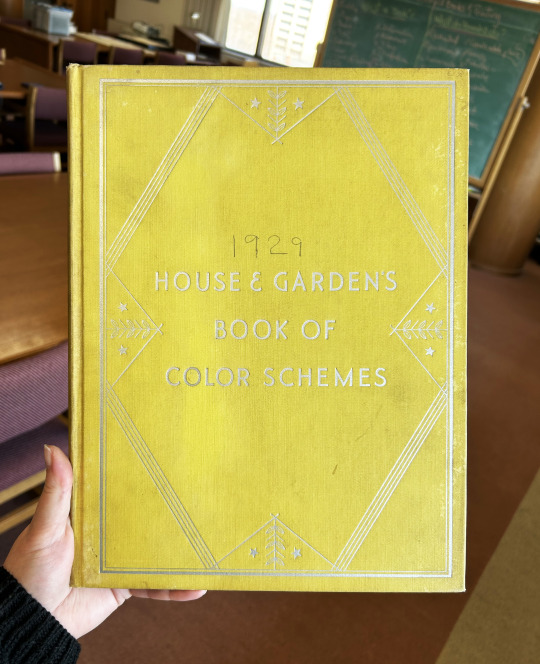

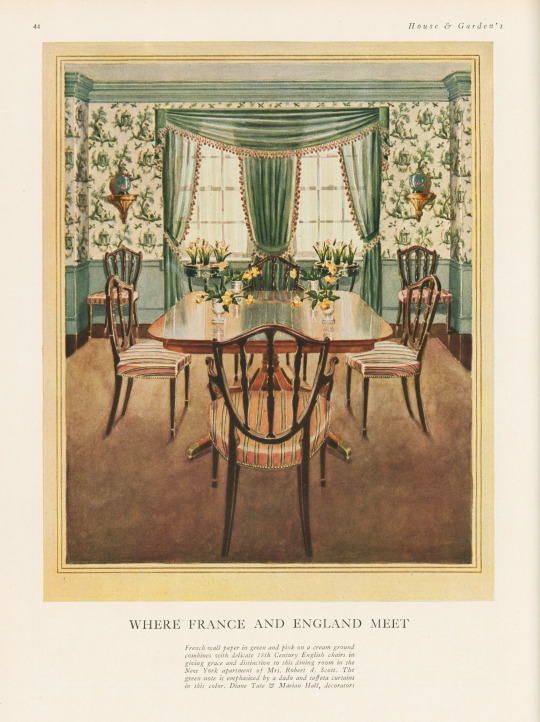
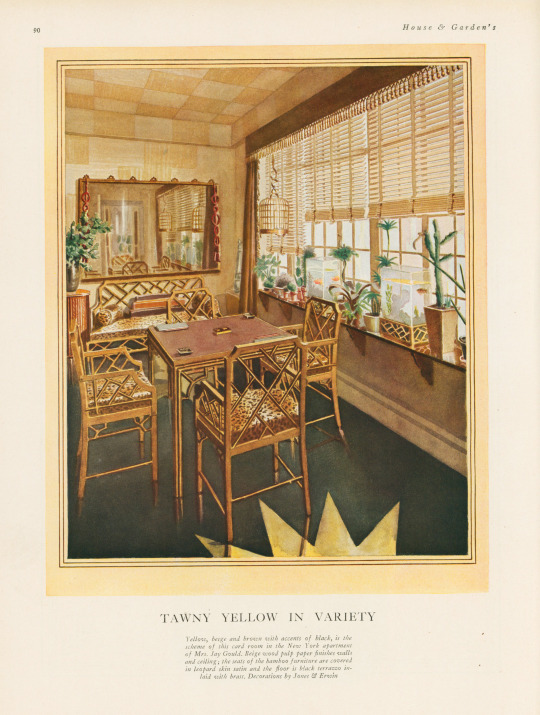

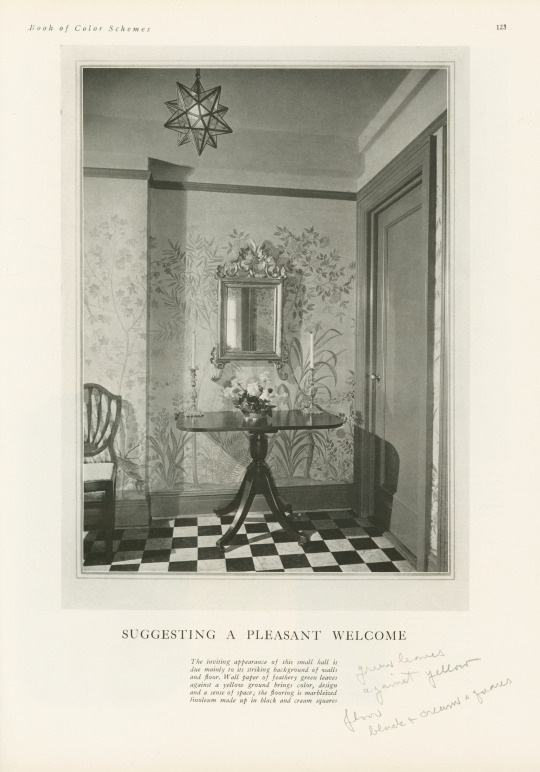
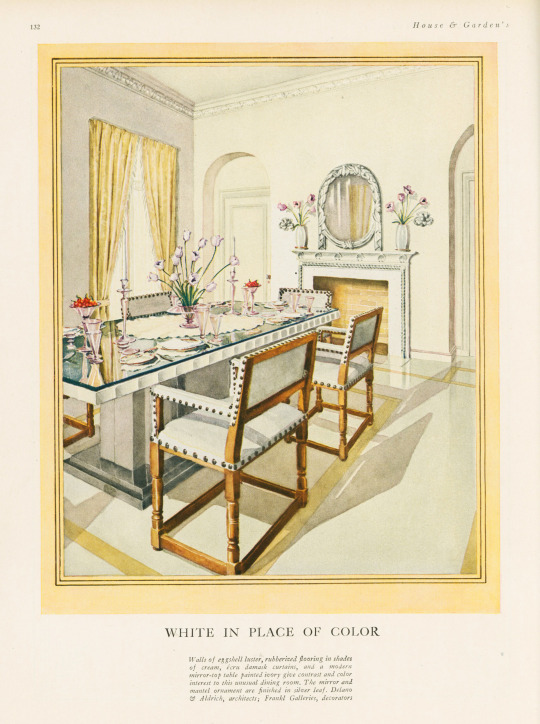

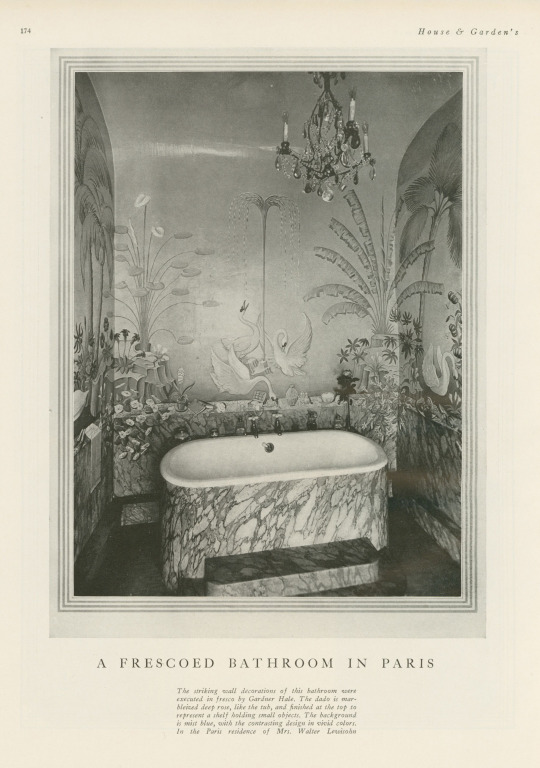
Decorative Plates
It's been awhile since we last posted something on the theme of the decorative arts, so I'm happy to have found this book—especially because it was mis-shelved in the stacks! This book is House and Garden's Book of Color Schemes, which contains "over two hundred color schemes and three hundred illustrations of halls, living rooms, dining rooms, bed chambers, sun rooms, roofs, garden rooms, kitchens and baths; the characteristic colors of each decorative period; how to select a color scheme, with unusual treatments for painted furniture and floors; a portfolio of crystal rooms and eight pages of unusual interiors in color." It was edited by long-time editor of House & Garden Richardson Wright (1887-1961) and Margaret McElroy, associate editor, and published by Condé Nast Publications, Inc. in 1929.
The book includes a large number of photographs of rooms, however, they are mostly in black and white—an unfortunate thing for a book about color! The promised eight color illustrations of rooms are not all present in our copy, but the five that are still in the book are shown here, alongside some of their black and white compatriots. I especially love the one titled "Tawny Yellow in Variety" that features a shocking amount of leopard print.
If you've read any of the posts I usually write, you know that I love a good binding—this one is a publisher's binding in a chartreuse-y yellow book cloth with art deco-style silver tooling featuring stars and leaves. Somebody took it upon themselves to write the publication date on the cover above the title—how thoughtful!
View more posts featuring Decorative Plates.
-- Alice, Special Collections Department Manager
#Decorative Sunday#Decorative Plates#decorative arts#House and Garden's Book of Color Schemes#color schemes#color#decoration#home decor#interior decorating#Richardson Wright#Margaret McElroy#Conde Nast#Conde Nast Publications#art deco#chartreuse#Publishers' bindings
90 notes
·
View notes
Text

Having a normal time reading House of Leaves (read: I am losing my marbles flipping through these pages upon pages of architectural digressions, trying to glean some meaning from them) when my eye caught on something.
ENHANCE

FLIP

ROBERT SMIRKE MENTION
#this book was published almost 2 decades before tma started#but after a hundred pages of this shit nothing feels like a coincidence anymore#im putting the pieces together im making it make sense#*hands trembling*#house of leaves#tma#the magnus archives#robert smirke
46 notes
·
View notes
Text


Since the foundation of their Brooklyn-based office SO-IL in 2008 Jing Liu and Florian Idenburg have focused on the design of residential buildings as antithesis to the monotonous and over-regulated housing of the present day. With their designs the architects seek to reintroduce communal spaces, open layouts and thus the opportunity for inhabitants to interact rather than isolate. As a sort of retrospective of the last ten years of restless architectural production SO-IL recently published „In Depth: Urban Domesticities Today“ with Lars Müller Publishers, a comprehensive and extensively illustrated overview of their projects featuring a wealth of plans and photographs by Iwan Baan and Naho Kubota.
In her preface to the volume Jing Liu discusses in-depth SO-IL’s historical paragons and sheds light on how the monotony and lack of community in housing came about. At the same time she interlaces positive examples from the past like the traditional Chinese siheyuan courtyard, the Japanese engawa/streets in the air or the Smithsons’ Golden Lane Estate which all share communal outside spaces, few to no corridors and the overall insight that housing entails more than simply providing shelter and privacy.
As Florian Idenburg states, one of the core problem areas of housing in general and in the US in particular is the corridor and whose cancellation is the topic of Nicolas Kemper’s essay: his personal experience with the double-loaded corridor prompted him to look deeper into the history of corridors, the building regulations and its facilitation of the corridor. Consequently, he pleads for a fundamental reform of building codes and by the example of SO-IL’s 450 Warren project shows that it is indeed possible to avoid corridors altogether.
The former project also is part of the comprehensive project documentations consisting of a great number of plans, sections and very lively photographs that demonstrate the quality of life SO-IL’s buildings facilitate. Consequently the book not only is a smart and informative read but also a reminder of how good housing, even in today’s densified form, can be if emphatic architects are in charge. A highly recommended book!
#so-il#contemporary architecture#housing#architecture#usa#architecture book#lars muller publishers#monograph#book
21 notes
·
View notes
Text
the urge to give up on EVERYTHING and disappear >>>
#scarlet thinks this and then they remember that she does have so much left to do still#like? i cant die before publishing my book wtf#i have those two half written fanfic reviews to complete#(areia honey im so sorry 😭 im a terrible friend ifk)#i have people to proove wrong#i have a house with floor-length windows facing the ocean on top of a cliff to buy and live in#i cant give up just yet
18 notes
·
View notes